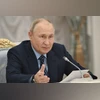Despite pressure, we are largest economy of Europe: President Putin
Russian President Vladimir Putin has said that the country has become Europe's first economy and stands at number fifth in the world in terms of purchasing power parity
)
Russian President Vladimir Putin (Photo: PTI)
Listen to This Article
Russian President Vladimir Putin has said that the country has become Europe's first economy and stands at number fifth in the world in terms of purchasing power parity, according to Russian media outlet TASS.
He said that Russia is the largest economy in Europe, leaving the entire continent behind in terms of purchasing power parity.
"It seems that we are being strangled and pressured from every side, but still, we are the largest economy in Europe," Putin said at a meeting with entrepreneurs active in Russia's Far East, according to TASS.
"We left Germany behind and climbed to fifth in the world [in terms of GDP at purchasing power parity]: China, the US, India, Japan and Russia. We are number one in Europe," he added.
The Russian President, however, underlined that the country still "needs to work harder" for the per capita indicator.
Also Read
"We have left all of Europe behind in terms of purchasing power parity but as for the per capita indicator, we need to work harder. There is still work to be done," TASS quoted him as saying.
Since the war began, Russia has been unable to access the substantial portion of its foreign exchange reserves held by its central bank which were blocked in the West as a part of the sanctions for its invasion of Ukraine, according to CNN.
The Russian central bank had claimed then that the quickly disappearing surplus was one of the contributing factors to the ruble's decline
In 2023, the currency had lost over 30 per cent of its value, according to CNN.
In a veiled attack on the United States and other Western countries, the Kremlin, in October last year had said that the Russian economy has adapted well to the Western sanctions and Moscow doesn't fear more such action.
"Russia has been living under a sanctions regime for quite a long time, for decades, and we have sufficiently adapted to it, so such time horizons as five to 10 years do not scare us," Kremlin spokesperson Dmitry Peskov told reporters then, according to Al Jazeera.
Kremlin further said that the sanctions have "boosted" its domestic economy and industrial production.
The Russia-Ukraine war started on February 24, 2022. A day after, the European Union introduced wide-ranging sanctions intended to send a clear signal to Moscow that there would be severe consequences for the war.
The bloc has imposed 11 sanctions packages to date and last week said it would work to shut down loopholes in the existing measures. EU officials have suggested the sanctions could remain in place for years, Al Jazeera reported.
Meanwhile, the Western countries and Kyiv allege that Moscow is engaged in an "unprovoked war of aggression" in Ukraine. On the other hand, Moscow accuses Western powers of using Ukraine to try to weaken and undermine Russia's own security.
(Only the headline and picture of this report may have been reworked by the Business Standard staff; the rest of the content is auto-generated from a syndicated feed.)
More From This Section
Don't miss the most important news and views of the day. Get them on our Telegram channel
First Published: Jan 12 2024 | 2:37 PM IST


